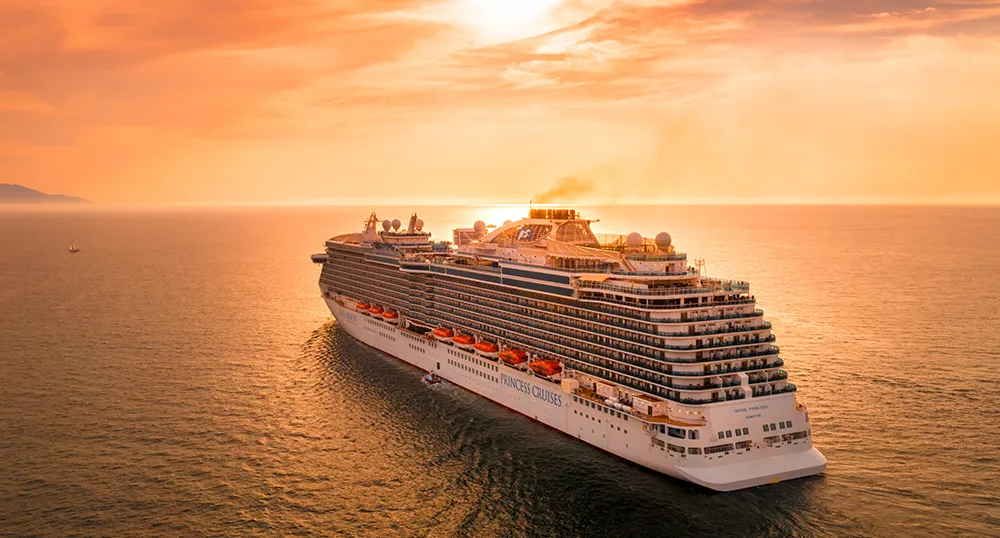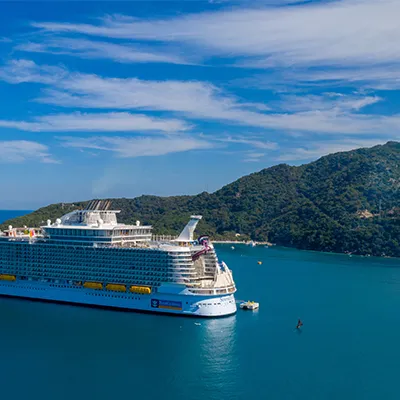Is Cruise Insurance Worth It? What To Consider Before Buying
Travel Team | Oct 24, 2023

When it comes to important purchases and managing your money, you want to be sure you’re making the right decision.
If you’re buying a new computer, you talk to tech experts. If you need someone to help manage your retirement funds, you go to an investment broker. If you need to rewire your house, you hire a certified electrician. And in each of these scenarios, you probably aren’t choosing the first listing you see. You do your research.
The same goes for purchasing travel insurance to cover your cruise vacation. Be sure to consider all your options and choose the provider and plan that offers the best protection for your trip.

Do I Have To Buy Travel Insurance For My Cruise?
In most cases, it is not required to have travel insurance for a cruise. However, it’s always best to check with your cruise line about their requirements. You don’t want to be prevented from boarding because you don’t have proof of insurance.
If you plan to get off the ship for land excursions during your cruise, confirm whether the countries hosting your stops require travel insurance for international visitors. Some destinations now require travel insurance with COVID coverage. Even if travel insurance is not required for entry, you may find that having it in case of emergencies gives you the confidence to enjoy your trip more fully.
Should I Buy Insurance from the Cruise Line?
Cruise lines may offer travel insurance and do so in a temptingly convenient way by allowing you to add it to the price of your cruise when you purchase your ticket. However, you might not be getting the right coverage, no matter how easy it seems.
Just like you shop around for the best electrician to rewire your house, it’s worth looking elsewhere to make sure you choose the best travel insurance for your trip. We recommend talking with an agent who sells travel insurance or a company like Seven Corners that specializes in travel insurance.
When considering all your options, pay special attention to how you’ll be reimbursed if you have to cancel or interrupt your trip. With travel insurance from a company like Seven Corners, reimbursement is monetary. A paid claim means money back in your bank account. Some cruise lines, on the other hand, provide a reimbursement in the form of a credit to use for future sailing. If you’d rather have the money back, travel insurance is the better option.
Another one of the most important differences to recognize between travel insurance and the protection you might buy directly from the cruise line is that the cruise line typically only covers the cruise itself. In other words, the cruise line might reimburse you if you have to cancel but only for your fare.
Travel insurance from a company like Seven Corners, however, offers protection for events that happen beyond the cruise itself. This could be reimbursement for airfare to get to the port or a pre-departure hotel stay if you have to cancel your trip, for example.
“While purchasing insurance from the cruise line isn’t the worst thing you could do — that would be skipping insurance altogether — there may be a better option than what the cruise line offers you,” says Angela Borden, a travel insurance product specialist at Seven Corners. “Think about all of your trip expenses, not just the cruise fare itself, and choose a travel insurance plan that will cover your investment more fully.”
What If I Have Travel Insurance Through My Credit Card?
Many credit cards offer some form of insurance. However, travel protection offered through credit cards often comes with exclusions that people don’t expect.
Health benefits if you get hurt during your trip might be limited to something major like the loss of an arm, but not a visit to the doctor if you get the flu. Benefits like trip cancellation will have similar exclusions, so be sure to read the fine print of your credit card’s policy before you rely on it for your coverage.
It’s also worth noting that you might only have coverage from your credit card if you use that card for your travel expenses. As an example, let’s say you put your airfare on Card X because it has a better interest rate. You might not be able to use Card Y’s insurance if you want a refund on your airfare later.
Find more ways to decide if travel insurance from a credit card is worth it.

What Does Travel Insurance for Cruises Cover?
Your cruise insurance coverage will depend on the benefits you select. It’s not as difficult as you might think to find the right trip insurance, even with the variety of options available to you. Here are a few benefits to look for as you weigh your options.
1. Travel insurance for missed connections
An important benefit you may not see on trip insurance offered by cruise lines addresses one of cruisers’ biggest worries: “What if my plane is late, and I miss the ship?” Seven Corners’ cruise insurance includes missed cruise connection benefits.
If you miss your cruise ship due to a delay that meets the time length stated in your plan document (three hours for Seven Corners Trip Protection Basic and Choice plans), the missed cruise and tour connection benefit reimburses you for these items:
- Additional transportation costs to join your cruise.
- Meals, local transportation, and lodging.
In order for a benefit to be paid when you make a claim, your situation must have been triggered by a covered reason. All trip protection plan documents will have details about these covered reasons. Our plans provide the missed connection benefit if you miss the ship for one of these covered reasons:
- Your plane is late.
- A documented inclement weather condition.
- You are under quarantine.
- You experience a hijacking.
- A strike occurs that affects you and your travel plans.
- A natural disaster affects you and your travel plans.
- A terrorist event or a riot occurs that affects you and/or your travel plans.
2. Optional Cancel for Any Reason (CFAR)
Cancel for Any Reason is an optional benefit you may not see offered by the cruise line. Most trip insurance includes a list of covered reasons that trigger benefits. One of these triggers — including sickness, injury, traffic accident, and weather, for example — must occur before you can cancel your trip.
But when you add the optional CFAR benefit, you can cancel your entire trip for any reason you wish*.
This benefit costs extra, and you are reimbursed for 75% of your nonrefundable trip costs instead of 100%, but if you have an unusual situation you feel could cause you to cancel your trip, it’s worth it.
Seven Corners offers CFAR on our Trip Protection Basic and Choice plans.
You must select this benefit within the time sensitive period and pay the additional plan cost to receive it. For the plans mentioned above, the phrase “time sensitive period” means you must purchase your plan within 20 days of the date your initial payment or deposit of your trip is received, and within 15 days of payment for any subsequent travel arrangements added to your trip. Other terms apply.
3. Protection for an emergency medical evacuation
This benefit is a big deal. If you are in a location that cannot provide the medical care you need, the emergency medical evacuation benefit covers the cost to move you to a location where you can receive appropriate care.
Emergency medical evacuations vary a great deal in terms of cost because they can range from an upgraded airline seat to much more expensive options depending on the medical condition you have. The cost can vary from $500 to $200,000 or more.
Without trip protection that has an emergency medical evacuation benefit, you would be responsible for the cost.
Read Ed and Marilyn’s story to see how Seven Corners handled a real-life emergency medical evacuation when Ed got sick on their cruise.
4. Pre-existing conditions
If you have health conditions or you are traveling with someone who does, it’s important to secure coverage for pre-existing conditions. Not all trip insurance covers pre-existing conditions, so it's recommended that you talk to a licensed travel insurance agent to better understand if a pre-existing conditions waiver is included in a plan. This waiver essentially eliminates the exclusion for pre-existing conditions in the plan document if you meet the stated requirements.
To get the waiver, you must buy the plan within the time sensitive period, which varies by plan. For example, like the CFAR coverage we mentioned above, in order to receive the waiver you must purchase a Seven Corners Trip Protection Choice plan within 20 days of the date your initial payment or deposit for your trip is received and insure the cost of subsequent travel arrangements added to your trip within 15 days of the date you paid for each of them.
5. Protection for your belongings
We all travel with luggage and items that are important to us. A good trip protection plan will cover loss, theft, and damage to baggage and personal effects. These benefits are typically secondary to other coverage, such as any reimbursement an airline would provide for losing a bag.
6. 24/7 travel assistance services
Last but not least, most trip protection plans come with travel assistance services. Seven Corners Assist provides 24/7 non-insurance services from our multilingual team. If you need an emergency medical evacuation, this team will handle it.
They can also help you locate medical care when you're abroad and arrange translation services. And when you're hospitalized unexpectedly, they can help coordinate direct billing with medical facilities.
How Much Does Cruise Insurance Cost?
The general rule of thumb for the cost of trip insurance is that it is roughly four to eight percent of the cost of your trip.
The factors that drive the price include your age and the cost of your trip, as well as the benefit levels you want.
To give you an idea of what this could look like, here’s a scenario to consider. Your exact situation may differ.
Let’s say I (hi, Becky here) am going on a solo cruise to Greenland and Canada.
- I live in Indiana, but my cruise leaves from Baltimore, Maryland.
- The cruise is for 14 days — May 26 to June 9 — but my total trip will be 16 days. I’m adding an extra day on each end of the cruise to give me time to travel to and from Baltimore.
- I choose an Ocean View cabin, which isn’t the least expensive option, but it isn’t the most expensive either. (I’m splurging a little for my 40th birthday!) Adding taxes, fees, and port expenses to the cost of the berth, plus the single supplement, my cruise fare is $6,024.65.
- I book a flight from Indianapolis to Baltimore for $451. Although I also book hotel rooms, they’re refundable.
- When I visit the Seven Corners website to get my quote, I provide where I’m going (entering both Canada and Greenland), my trip dates (May 25-June 10), and my age (39). I also say that I want coverage for trip expenses, medical expenses, and belongings. I enter my total trip cost as $6,476, which includes my cruise and my airfare. My hotel rooms are refundable, so I do not include those in my total.
- I then decide to add Cancel for Any Reason (CFAR) coverage to my Trip Protection Basic plan. This increases the cost of my plan, but I like the additional protection it offers.
The price for my plan, based on my age and selections, is $506.94. The total is just a fraction of what I might otherwise lose — nearly $6,500 — if I have to cancel my trip. It’s also a small price to pay if I get hurt or sick during the cruise and need medical care that my own domestic insurance won’t cover.
It’s easy to check pricing for all our trip insurance plans so you have an idea of the cost before purchasing anything.
Is Cruise Insurance Worth It?
Travel insurance for cruises, sometimes called cruise insurance, is typically worth it when you consider how it can help. Not only can travel insurance for cruises help protect the money you spend on your trip if you have to cancel or come home early for a covered reason, but it can also help with medical expenses if you get sick or hurt while away from home on a cruise.
Many travelers find it difficult to put a price on the financial peace of mind that cruise insurance provides.
Need Help Finding the Right Cruise Insurance for Your Trip?
Now you know the answer to “Do I need special travel insurance for a cruise?” You’re ready to take the next step in confident travel.
Seven Corners has been a leader in travel insurance for 30 years. We offer a variety of plans that can be customized to fit your needs, whether you’re a first-time cruiser, taking the family for a semi-regular sail, or someone who takes multiple cruises throughout the year.
Contact our licensed sales team or use our interactive online guide for help choosing the best plan for you.
*Cancel for Any Reason does not cover the failure of the Travel Supplier to provide the bargained-for Travel Arrangements due to cessation of operations for any reason.
Search Posts
Receive our monthly inspiration and travel tips from the travel insurance experts.
Sign me upThis website and various social media updates provided by Seven Corners contain content, information, articles, videos, and links to websites created by third parties. Seven Corners, its owners, and its employees neither endorse nor are responsible for the accuracy, timeliness, or reliability of any third-party information, statements, opinions, or advice and are not liable for any loss, harm, or damage caused by your reliance upon them. Use of such information or the linked websites is entirely at your risk. Concerns regarding this third-party content should be directed to the third party. Seek professional advice, as appropriate, regarding your use of such information and websites.
Because the information on this website and in Seven Corners’ blogs and other social media is written and compiled using knowledge and information available at a certain point in time, it may become outdated. For that reason, information, events, legal requirements, and product changes (including benefits, limitations, exclusions, and services) may not be up-to-date, complete, or accurate at the point in time it is being read. Again, use of such information is at your risk.
